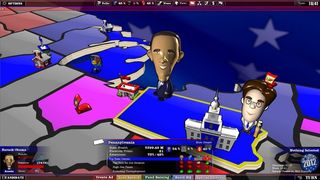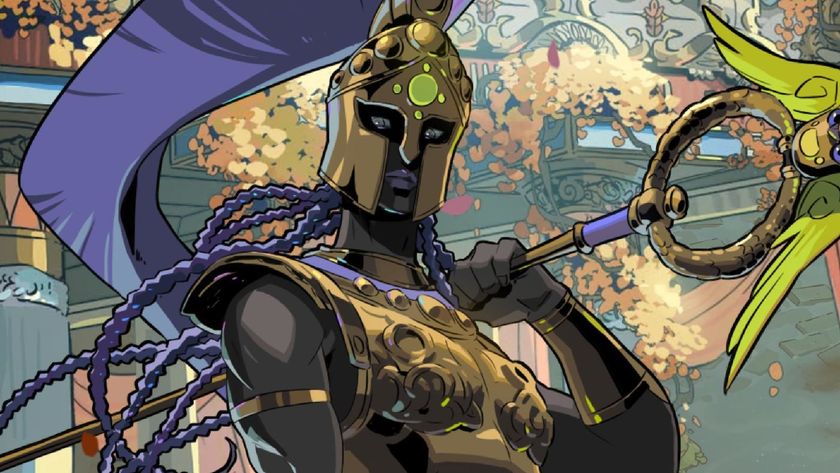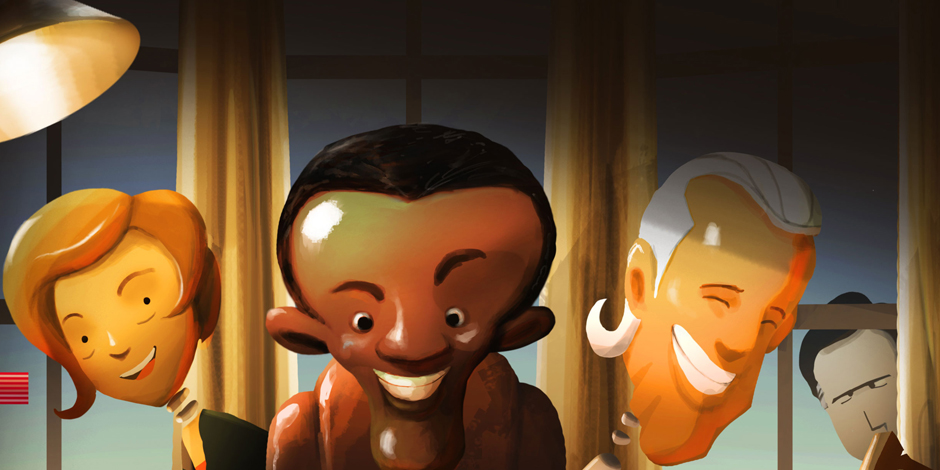12DOVE Verdict
Pros
- +
Whimsical graphics and a fun style
- +
Adequate simulation of the political system
- +
Robust character creation
Cons
- -
Missing modes from previous games
- -
Not as deep or complex as it could be
- -
Little replayability
Why you can trust 12DOVE
2012 is an election year in America, meaning it's time for the Republicans and Democrats to go head-to-head in mud-slinging and filibusterering in hopes of winning over the hearts and minds of the country's voters. While this might seem like a noble attempt at democracy, it's actually anything but--with career politicians treating the American people like some sort of massive game of Risk and doing whatever it takes to get elected, the political process is actually much more like a video game than an actual democratic ordeal. It's because of this sad reality that Stardock's The Political Machine series works so well; it's essentially the Madden of democracy.
In 2012’s edition, the game has been updated to feature a wide-range of artistically stylized politicians, allowing gamers to choose between Barack Obama and Mitt Romney (obviously), as well as other would-be candidates like Hillary Clinton, Al Franken, Ron Paul, and many others. It’s also possible to create your own bobblehead character, choosing between dozens of different facial and body options to create the candidate of your choosing, complete with a political party and relevant issues. The creation tools aren’t that polished, and it’ll take a while to get your candidate looking just right, but with enough finagling you’ll be able to create your own personal bobblehead.
Check out the game's trailer to see The Political Machine in action
Once you've chosen your candidate, you’ll do just what real-life politicians do: travel around the country stopping in the swing states worth the most electoral points and begging them to vote for you by telling them what they want to hear. You’ll go to Ohio and promise to fix unemployment, head to Florida and set up a television advertisements supporting Medicare, fly up to New York to raise money, and then you’ll swing over to California to complain about how your opponent supports Chik-fil-A. Everything you do, from campaigning to opening up new offices, raises or lowers your ranking among the Democrats, Republicans, and Independents in the chosen state, moving the needle towards your victory by bouncing around the poll numbers. Choosing (or creating) a candidate's positions doesn't really have much of an impact, though, due to the fact that raising your political awareness is based more around your ability to grovel than your actual stances.
Obviously, you’re not alone. Your opponent is rampaging around the country doing the same thing as you are, attempting to stifle your political prowess around every turn. It’s overwhelming at first--especially if you’re not all that well-versed in American politics--but before long, the numbers and charts start to make sense, and a deeper layer of strategy shows. As you up the difficulty and enter into longer campaigns, you’ll need to play things more strategically, since running from state to state and complaining about gas prices will only get you so far. It’s quite rewarding, especially if you’re a fan of the political system, to see if it’s possible to win a difficult campaign by taking your opponent's home state or campaigning just on specific issues. Options like appearing on different cable news shows and meeting proxies for the likes of Bill O'Reilly and Stephen Colbert help vary the otherwise complicated map, and the ability to unlock new dialogue options for their interviews should put a smile on any politically-aware gamer's face.

But after you've campaigned a few times and beat out your opponents, fulfilling every political dream you could possibly have, there's very little to keep you playing. In 2008’s The Political Machine, Stardock included historical and fictional figures, as well as several different campaign maps to keep things varied. It also helped keep the game accessible to those uninterested in American politics and relevant past the election. Not being able to campaign in the 1800s or attempt to win over an alien planet's people cheapens the overall value, especially considering these options were available in the last game. Being able to campaign online is good and all, but it’s still a paltry offering that could have been much more worthwhile if there was more content, even if it was literally just the same content from 2008 adapted to the fit in with 2012's minor changes.
The Political Machine 2012 is a light-hearted, albeit somewhat cynical look at the American political system. In fact, it's this conflict that might cause the most strife for potential buyers--it's too absurdly mechanical for those uninterested in the process, and too bare-bones and lackluster for those willing to engulf themselves in it. Still, at a mere $10, it's a worthy purchase for any politically-minded voter, if not just to give them something to do besides arguing with people on Facebook and reading political blogs until the end of November.
More info
| Genre | Simulation |
| Description | Stardock's tactical strategy game set during the 2012 American presidential election. |
| Franchise name | The Political Machine |
| Platform | "PC" |
Hollander Cooper was the Lead Features Editor of 12DOVE between 2011 and 2014. After that lengthy stint managing GR's editorial calendar he moved behind the curtain and into the video game industry itself, working as social media manager for EA and as a communications lead at Riot Games. Hollander is currently stationed at Apple as an organic social lead for the App Store and Apple Arcade.

Hades 2 devs say "we have not recast any of our characters" in the roguelike amid concerns during the ongoing SAG-AFTRA video game strike

After Amazon lands control of James Bond, Jeff Bezos turns to social media for ideas with predictable results as stans of all kinds swarm his replies: "Who’d you pick as the next Bond?"

Dwayne "The Rock" Johnson is set to lead Martin Scorsese's new movie, which is being described as Goodfellas meets The Departed
Most Popular




